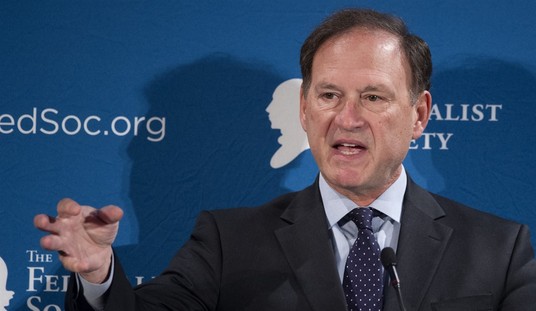Many hours have passed since the Supreme Court made its ruling on the Hobby Lobby case. And as we all know, the Leftist media and Twitterverse has been apoplectic since then, spewing the same tired invective that it usually does when a ruling like this doesn’t go its way. Let’s take a look at a few of the key themes that are out there today, shall we?
First, we have the “denying access to birth control” meme, perpetuated by none other than Senator Elizabeth Warren:
Can’t believe we live in a world where we’d even consider letting big corps deny women access to basic care based on vague moral objections.
— Elizabeth Warren (@elizabethforma) June 30, 2014
That’s a pretty entertaining tweet right there – she could be a success at stand-up. First off, Liz, “big corps” are not what this ruling was about. The SCOTUS decision pertains specifically to “closely held corporations”. These are generally (but obviously not universally, given the size of Hobby Lobby) smaller companies that are controlled by 5 or fewer individuals. And this is not some sort of made-up phrase – it is specifically defined by none other than the IRS. You know, that government agency that preys on conservative groups. Now the “restriction” to closely-held corporations does make it a pretty wide-ranging decision, since around 90% of U.S. corporations fall into this category, although only a small majority of American workers are employed by such firms.
Now about that “vague moral objections” and the oft-screeched “companies can’t impose their religion on their employees!!11!” theme – Liz, once again, you and your ilk missed the boat on the ruling. This is not about birth control and “vague moral objections”. This is a specific objection to abortiofacient drugs. Hobby Lobby provides coverage for birth control today. What they object to – and this isn’t vague at all – is abortion, and in this case, that the government was forcing them to fund abortion. And the court ruled that they did not have to provide access to those specific drugs.
But let’s pretend the ruling allowed them to not pay for any kind of birth control, abortiofacient or not. Even after this ruling, no one is preventing a single female from accessing these drugs. Their doctors can prescribe them, they can buy them over the counter, or whatever. No one is preventing that. The ruling simply says that closely-held corporations do not have to pay for them. Hobby Lobby isn’t restricting access to healthcare any more than Blantons is restricting my access to its bourbon by pricing it at $45. If I want it, I’ll pay for it. My health insurer has, on numerous occasions, stopped paying for certain drugs. I didn’t run to the courts. I just sucked it up and paid out of pocket. If I had really had an issue with it, I could have quit and found another job with better benefits. So can the allegedly-aggrieved women here.
The other frequently blathered complaint today was about Hobby Lobby “forcing its religion on its employees”. The SCOTUS majority opinion covered this in detail. A while ago I was listening to Erick’s radio show and heard him refer to this, so I’ll give him the credit here…one of the footnotes in the ruling covers this well. I’ll quote it here. From the ruling, footnote 23:
3 See, e.g., 724 F. 3d, at 385 (“We do not see how a for-profit, ‘artificial being,’ . . . that was created to make money” could exercise religion); Grote v. Sebelius, 708 F. 3d 850, 857 (CA7 2013) (Rovner, J. dissenting) (“So far as it appears, the mission of Grote Industries, like that of any other for-profit, secular business, is to make money in the commercial sphere”); Autocam Corp. v. Sebelius, 730 F. 3d 618, 626 (CA7 2013) (“Congress did not intend to include corporations primarily organized for secular, profit-seeking purposes as ‘persons’ under RFRA”); see also 723 F. 3d, at 1171–1172 (Briscoe, C. J., dissenting) (“[T]he specific purpose for which [a corporation] is created matters greatly to how it will be categorized and treated under the law” and “it is undisputed that Hobby Lobby and Mardel are for-profit corporations focused on selling merchandise to consumers”).
The principal dissent makes a similar point, stating that “[f]or-profit corporations are different from religious nonprofits in that they use labor to make a profit, rather than to perpetuate the religious values shared by a community of believers.” Post, at 18–19 (internal quotation marks omitted). The first half of this statement is a tautology; for- profit corporations do indeed differ from nonprofits insofar as they seek to make a profit for their owners, but the second part is factually untrue. As the activities of the for-profit corporations involved in these cases show, some for-profit corporations do seek “to perpetuate the religious values shared,” in these cases, by their owners. Conestoga’s Vision and Values Statement declares that the company is dedicated to operating “in [a] manner that reflects our Christian heritage and the highest ethical and moral principles of business.” App. in No. 13–356, p. 94. Similarly, Hobby Lobby’s statement of purpose proclaims that the company “is committed to . . . Honoring the Lord in all we do by operating . . . in a manner consistent with Biblical principles.” App. in No. 13–354, p. 135. The dissent also believes that history is not on our side because even Blackstone recognized the distinction between “ecclesiastical and lay” corporations. Post, at 18. What Blackstone illustrates, however, is that dating back to 1765, there was no sharp divide among corporations in their capacity to exercise religion; Blackstone recognized that even what he termed “lay” corporations might serve “the promotion of piety.” 1 W. Blackstone, Commentaries on the Law of England 458–459 (1765). And whatever may have been the case at the time of Blackstone, modern corporate law (and the law of the States in which these three companies are incorporated) allows for- profit corporations to “perpetuat[e] religious values.”
Note the part that I bolded. There is legal precedent for for-profit companies promoting religious values. So yes, Hobby Lobby is promoting religious values. That’s legal. And employees, if you don’t like it, don’t work there. No one is forcing you to work for Hobby Lobby. After all, it’s not like this was a secret – they are one of many Christian-owned companies who recognize the Sabbath and close on Sundays. Good for them! (There’s a lot more in the ruling than that quote. I encourage you to download the decision and read it…you don’t need to be a lawyer to understand it. It’s pretty interesting stuff)
By the way, this ruling was a win for the Religious Freedom Restoration Act of 1993, an act passed almost unanimously by both the House and Senate, and signed by DEMOCRAT President Bill Clinton. If the Left doesn’t like the results of today’s ruling, they ought to be complaining to their hero Bill and his almost-POTUS candidate wife Hillary.
This is not an anti-woman ruling. It is anti-religious discrimination. Post-Hobby Lobby, women still have access to contraceptives. They still (unfortunately) have access to abortiofacient drugs. They can pay for them out of their own pockets. Companies have had, and thanks to this ruling, still DO have the ability to “practice what they preach” with respect to their religious beliefs. They are not forcing their religion down the throats of employees or customers. If the employees don’t like it, they can quit, and customers can go elsewhere. The irony of this is that the vast majority of Hobby Lobby’s customers are: women. If this ruling has a profound impact on women, the best thing that women can do is not shop there. Somehow I don’t think that’s going to happen.
One other interesting observation: The Gospel Coalition, a great evangelical organization, published a story today about how to talk to friends and neighbors about this ruling. It is well worth a read. The author of the article makes a pretty thoughtful observation:
We should start by recognizing that the narrow majority of the Supreme Court doesn’t reflect the majority of our population. The Sexual Revolution has introduced assumptions and “givens” into our thought processes today, making religious liberty objections seem increasingly odd or fanciful.
Consider this. A generation ago, a person’s religious observance was a public matter, a defining characteristic of one’s identity, while a person’s sexual activity was something private. Today, this situation is reversed. A person’s sexual behavior is now considered a defining characteristic of identity, a public matter to be affirmed (even subsidized) by others, while religious observance is private and personal, relegated to places of worship and not able to infringe upon or impact the public square.
The culture clash today is less about the role of religion in business or politics, and more about which vision of humanity best leads to flourishing and should therefore be enshrined in or favored by law.
As sarcastic as I may be in dealing with the more obnoxious Leftist responses to the Hobby Lobby decision, I would definitely not respond that way to my friends, neighbors and family. Most are somewhat-helpless victims of the immorality spawned by the loosening of sexual standards. This is indeed a culture clash. One of these days I’m going to write a long-delayed essay on the various instantiations of “Two Americas.” This is yet another example of the split in America, but this time it’s between Judeo-Christian values and the post-modern “anything goes” values of non- or anti-religious Americans.
But at the very least, I’d like to see the lunatic Left apply at least a modicum of logic to their arguments. I suppose that’s too much to ask.














Join the conversation as a VIP Member